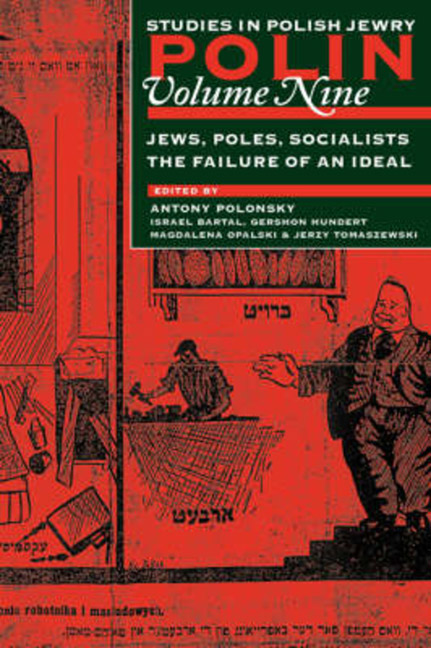Book contents
- Frontmatter
- Dedication
- Editors and Advisers
- Preface
- Acknowledgement
- Polin
- Polin: Studies in Polish Jewry
- Contents
- Note on Transliteration, Names, and Place Names
- Abbreviations
- Introduction
- PART I POLES, JEWS, SOCIALISTS: THE FAILURE OF AN IDEAL
- PART II NEW VIEWS
- Dov of Bolechów: A Diarist of the Council of Four Lands in the Eighteenth Century
- A Peaceable Community at Work: The Chevrah of Nasielsk
- Zionist Pioneering Youth Movements in Poland and their Attitude to Erets Israel during the Holocaust
- Resistance through Education: Polish Zionist Youth Movements in Warsaw, 1939-1941
- The Second Competition of Scholarly Works on Polish Jewish Themes
- PART III REVIEWS
- REVIEW ESSAYS
- BOOK REVIEWS
- Bibliography Of Polish-Jewish Studies, 1993
- Notes on Contributors
- Notes on Translators
- Glossary
- Index
Zionist Pioneering Youth Movements in Poland and their Attitude to Erets Israel during the Holocaust
from PART II - NEW VIEWS
- Frontmatter
- Dedication
- Editors and Advisers
- Preface
- Acknowledgement
- Polin
- Polin: Studies in Polish Jewry
- Contents
- Note on Transliteration, Names, and Place Names
- Abbreviations
- Introduction
- PART I POLES, JEWS, SOCIALISTS: THE FAILURE OF AN IDEAL
- PART II NEW VIEWS
- Dov of Bolechów: A Diarist of the Council of Four Lands in the Eighteenth Century
- A Peaceable Community at Work: The Chevrah of Nasielsk
- Zionist Pioneering Youth Movements in Poland and their Attitude to Erets Israel during the Holocaust
- Resistance through Education: Polish Zionist Youth Movements in Warsaw, 1939-1941
- The Second Competition of Scholarly Works on Polish Jewish Themes
- PART III REVIEWS
- REVIEW ESSAYS
- BOOK REVIEWS
- Bibliography Of Polish-Jewish Studies, 1993
- Notes on Contributors
- Notes on Translators
- Glossary
- Index
Summary
AN understanding of the attitude of the Zionist pioneering youth movements to the Land of Israel (Erets Israel), the centre and embodiment of their ideals, is essential to the appreciation of a much larger issue-the relations between the diaspora and the Yishuv (the Hebrew Zionist community in Palestine during the early 1920s to the late 1940s, under the British Mandate), and between Zionists and the Jewish people at large. It is all the more so during the Holocaust, the most difficult and controversial moment in these relations.
Despite its importance and implications, this issue has hardly been investigated, for two reasons. The first is the general difficulty of assessing and weighing attitudes and relations involving both national aspirations and individual dreams, phenomena that belong to an intangible sphere where the life and death of thousands of youngsters were determined. Moreover, the issue is of the utmost political and ideological significance in the post-Holocaust Yishuv and in the Jewish state, so that perhaps-and paradoxically-it has been avoided for so long precisely because of its importance.
The nature of the sources also poses difficulties. The source material is very small in quantity. It includes diaries written in Europe by members of the youth movements, during the events or very close to them; letters they sent to Erets Yisrael; and the press they published clandestinely. The latter survived the war in greater volume than the letters, and the letters in greater volume than the diaries. Yet the sum total of surviving material is but a fraction of the rich corpus of published and private writing originally produced. Moreover, the picture must necessarily remain incomplete: the output of certain movements has hardly survived, most members of other organizations have perished. The available material is thus random, and no reflection of the number of members or relative importance of the various movements.
The contents of the sources also raise problems. Does the press, the public expression of the movements’ views, reflect the same attitude as private writings such as letters and diaries? Do the sources reflect differences in the attitudes of the various movements to Erets Israel, and possible changes in such differences, arising from the war and the Holocaust?
- Type
- Chapter
- Information
- Jews, Poles, Socialists: The Failure of an Ideal , pp. 195 - 211Publisher: Liverpool University PressPrint publication year: 2008



